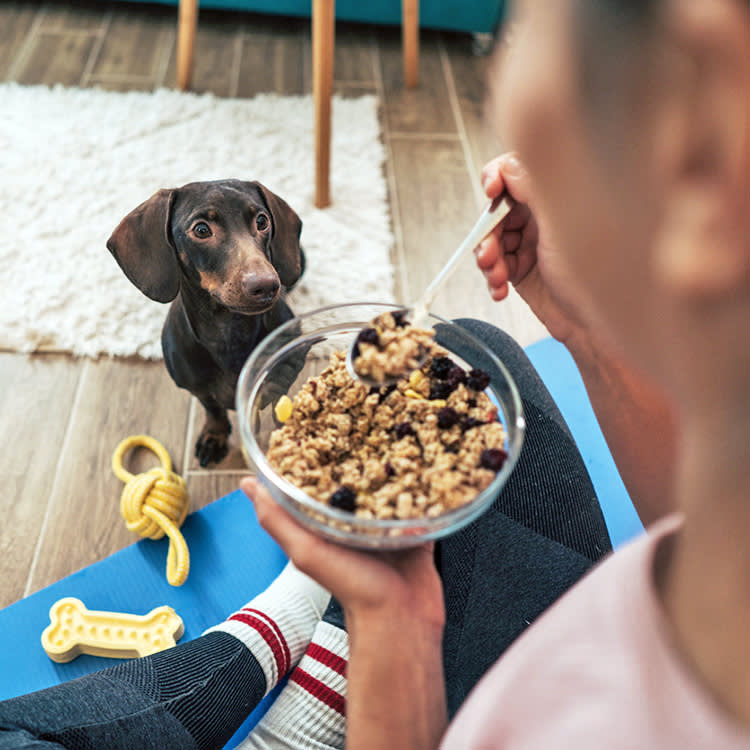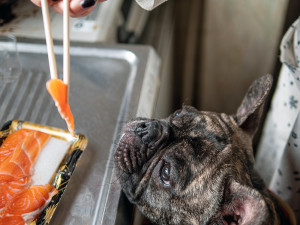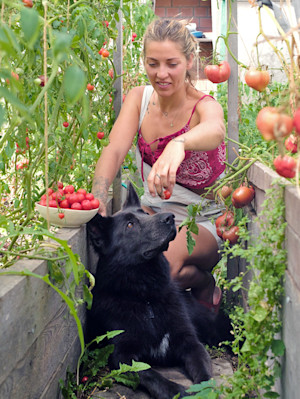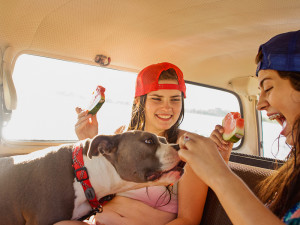Can Dogs Eat Raisins? Learn if Raisins Are Toxic to Them
It’s best to think twice about bringing this snack near your dog.

Share Article
In This Article:
What Are Raisins? Overview of Dog Nutrition Can Dogs Eat Raisins? What to Do if Your Dog Eats Raisins Treatments for Raisin Toxicity Safe Snack Alternatives
One of the more versatile snacks, raisins have made a name for themselves as being healthy, tasty, and even a little fun to eat. So, why wouldn’t we think about sharing raisins with our canine companions?
Raisins, and the grapes they are made from, are actually toxic to dogs — potentially very toxic. We aren’t completely sure how many grapes or raisins it takes to cause problems in dogs, so your best bet is to avoid giving them to your pup and keep them away from anything containing raisins.
What are raisins?
Raisins are dried grapes. We’re all familiar with the dark brown, almost black version of raisins, but there are other varieties as well, depending on the type of grape that was desiccated. For example, there are golden raisins, green raisins, and a slight variation on the original called a current. All are toxic to dogs, and so are the products made from them, including bread, cookies, trail mixes, and snack bars.

Raisins should not be confused with craisins, which are dried cranberries and not toxic to dogs.
Overview of dog nutrition
Dogs need a balance of six essential nutrients from the food they eat: water, protein, fats, carbohydrates, vitamins, and minerals. Though this may seem complicated, dog food manufacturers have made it easy for you by creating complete and balanced diets that contain everything most dogs need to stay healthy. The only thing you’d need to add to their diet is some fresh clean water, of course.
So, if your dog is eating high-quality dog food, they don’t need raisins or any other human foods to meet their needs. Of course, there are some dogs out there with certain health conditions who may do better with some types of supplements, but that’s for you to determine with your vet.
Can dogs eat raisins?
Dogs shouldn’t eat raisins, grapes, or currents. They do not need them nutritionally, and they are toxic to canines. Even just a few could cause some serious problems.
Why are raisins dangerous to dogs?
For a long time, no one — veterinarians and scientists included — knew why raisins were toxic to dogs. We just knew they were. There were theories for sure, but the important thing to understand was that dogs shouldn’t be given raisins intentionally, and they should see a vet if they accidentally ingest some. Otherwise, bad things, including kidney failure, could ensue.
Toxic compounds in raisins
After 20 years of knowing about the dangers of raisins without being able to pinpoint why, scientists discoveredopens in new tab that the toxic compound of raisins is a product called tartaric acid. The amount of tartaric acid varies greatly between types of grapes, their ripeness level, and the grape product, making it a complete surprise as to how dogs will react when they eat a few (or even a lot) of grapes or raisins.
Symptoms of raisin toxicity
Raisin toxicity may initially show up within 12 to 24 hours as digestive issues, such as vomiting, diarrhea, lack of appetite, and lethargy. Mildly affected dogs typically won’t suffer from any symptoms worse than this, while severely affected dogs will start to show signs of kidney damage after 24 to 48 hours. Symptoms like abdominal pain, increased drinking and peeing, bad breath, dehydration, and eventually not peeing may occur. Dogs can die if their kidneys are overly damaged.
What to do if your dog eats raisins
If you see your dog eat raisins, grapes, or products containing raisins (or suspect they have eaten them), call your vet or the pet-poison hotlineopens in new tab immediately. The sooner you take action, the better it is for your pup.
What are the treatments for raisin toxicity?
The best way to prevent lasting damage to the kidneys is to get the toxins out of your dog before they are absorbed. If your dog recently ate raisins, your vet may induce vomiting and give them activated charcoal to remove and absorb as much of the toxins as possible.
From there, they will take supportive action. Your pup will likely be hospitalized so they can be given fluids and anti-nausea medications while the vet monitors their kidneys. Kidney damage usually happens within the first 48 hours, so your vet will want to keep an eye on them for at least two to three days.
If caught and treated early, most dogs will recover from raisin toxicity, but the outcome has so many variables that it can be hard to predict.
Safe snack alternatives to raisins for dogs
Even if you may be carrying raisins around for yourself, they’re not something you should share with your dog. Instead, look into safer optionsopens in new tab such as:
Teats made for dogs
Bits of lean, cooked meat
Apples
Berries
Bananas
Carrots
Speak to your vet about other snack possibilities, as well as how much you can give your dog.
Bottom line
Though they may find their way into your recipes and snack regime, raisins aren’t something to be shared with your pup. They can be toxic and cause some very serious, even fatal, issues.
Raisins contain varying amounts of tartaric acid, which can cause kidney damage.
If your dog eats a raisin or grape, contact your veterinarian or the pet-poison hotline immediately.
References
“Acute kidney injury in dogs following ingestion of cream of tartar and tamarinds and the connection to tartaric acid as the proposed toxic principle in grapes and raisins.” Journal of Veterinary Emergency and Critical Care. 9 Sep 2021. https://6370293.fs1.hubspotusercontent-na1.net/hubfs/6370293/J%20Vet%20Emergen%20Crit%20Care%20-%202022%20-%20Wegenast%20-%20Acute%20kidney%20injury%20in%20dogs%20following%20ingestion%20of%20cream%20of%20tartar.pdfopens in new tab.
“Human Foods Dogs Can Eat: Complete List.” The Vets. 20 Jan 2025. https://thevets.com/resources/pet-nutrition/human-food-dogs-can-eat/opens in new tab.

Dr. Chyrle Bonk, DVM
Dr. Chyrle Bonk has been a mixed-animal veterinarian since 2010, with a special interest in rehabilitation. When she's not practicing or writing about veterinary medicine, you may find her exploring the outdoors with her family or tending to her cows, horses, chickens, or cats and dogs.
Related articles
![A person giving a banana to a dog.]()
10 Fruits and Vegetables That Your Dog Can Feast On
Indulge your pup (safely) with these delicious and healthy snacks.
![A woman walking in a golden field during sunset with her dog.]()
Unraveling the Grain-Free Dog Food Debate: Examining the Potential Link to Canine Heart Disease
Integrative veterinarian Dr. Lindsey Wendt shares advice on a sometimes controversial, always changing topic.
![Woman in the garden with her large black dog.]()
Dogs Can Thrive on a Plant-Based Diet, a Study Says—But Is It Actually Good For Them?
Everything you need to know about the pros and cons of a veggie diet.
![A young woman giving her German Shepherd mixed breed dog scratches in her kitchen]()
3 Reasons to Cook Your Own Dog Food
Adding a DIY component to your dog’s meals is a great, nutritious option.
![Teenagers Feeding a Dog Watermelon While Sitting In Car On a Sunny Day]()
9 Healthy Summer Snacks to Share With Your Dog
Your pup wants in on your crudité platter.







